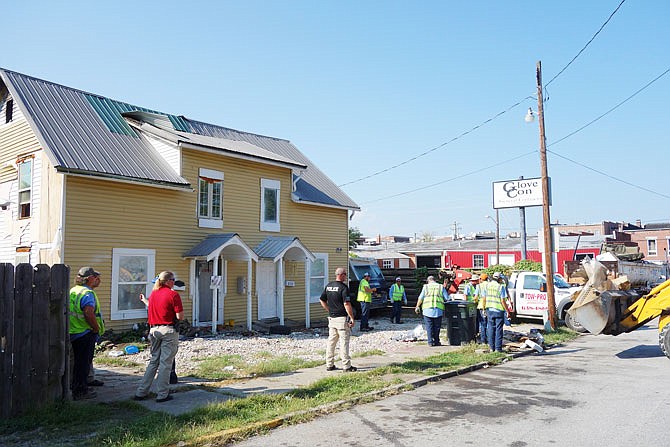About 15-20 Fulton city workers teamed up Wednesday morning to remove junk and debris from a Fulton house previously investigated for dangerous conditions.
"(We're) removing various items from the exterior of the property," City Administrator Bill Johnson said. "We're only concerned with the exterior today. The cleanup of this property shouldn't be a surprise to the occupant."
The items removed from 212-216 E. 6th St. ranged from couches to lawn care equipment and also included several broken-down vehicles and an RV. Two Fulton Police Department vehicles blocked off the street so workers could use a skidsteer to load a massive drive-off dumpster.
"We've had too many nuisance calls from this property," said Lt. Jason Barnes, who said police were present to serve the warrant to remove the clutter.
Barnes said the property's owner, Daniel Nash was "very cooperative" with city workers and officers Wednesday.
This is but the latest development in the ongoing struggle between the city and Nash. For years, Nash's neighbors have lodged complaints about the condition of his patchwork-painted and cluttered property.
"I've written to the council," said John Glover, owner of neighboring GloveCon. "It leaves a bitter taste in our mouth whenever someone pulls into our business. It drives down the property values of nearby houses and businesses."
Nash has personally crashed with neighbors, too - in July 2017, he was arrested for allegedly attempting to run over a neighbor with a car.
The building caught fire in November, though damage was mostly constrained to the upper floors.
Court decision
Wednesday's events resulted from a court case between Nash and the city: "Daniel Nash v. City of Fulton, Missouri," filed by Nash in May 2018. A judgment by 13th Circuit Judge Jeff Harris issued Aug. 16 traces the case's development.
In late October 2017, the city sent a "Notice to Vacate" to Nash, notifying him his property violated property code and constituted an unsafe nuisance. It cited a number of issues - including a lack of connection to city plumbing and utilities on the occupied lower level of the building - and ordered Nash to vacate the property and fix the issues.
Nash did not do so.
On March 16, 2018, the city sent another letter reiterating the issues and stating consequences for failure to remedy the nuisances within the stated timeframe. Separately, on April 12 of that year, he was notified of a hearing to determine whether the property constituted a nuisance May 7, 2018.
Nash did not attend the hearing nor did he send a representative. Hearing officers including Johnson, City Engineer Kyle Bruemmer and Planning/Protective Administration Office Dennis Houchins.
Hearing officers determined as the cost of repair exceeds the land's value, Nash would be required to vacate the property so the city could demolish it. On May 8, Fulton officials issued a demolition order to be carried out within 60 days.
On May 14, 2018, Nash filed his suit opposing the May 8 order.
The court agreed Nash's property constituted a nuisance on a number of fronts, from wiring issues to blocked-up exits. The court also agreed the city's order that Nash vacate and address the conditions was based on substantial evidence and was fair.
However, Harris found conditions on Nash's property do not justify demolition of the structure. Houchins and Johnson admitted at trial that demolishing the property was not necessary to bring it into compliance with code, Harris said.
According to the court order, Nash has until Jan. 1, 2020, to either abate the nuisances or vacate the structure, along with any other occupants of the house. If he fails to do so, the FPD may arrest him and he may not reoccupy the structure until it is repaired by the city.
"The cost associated with cleanup, we anticipate, will be filed as a tax lien against the property," Johnson said Wednesday.
Glover seemed less-than-confident Wednesday's efforts would prove a permanent solution.
"It won't be long until he's dragging stuff back," Glover said. "But it's nice the city's doing something."

